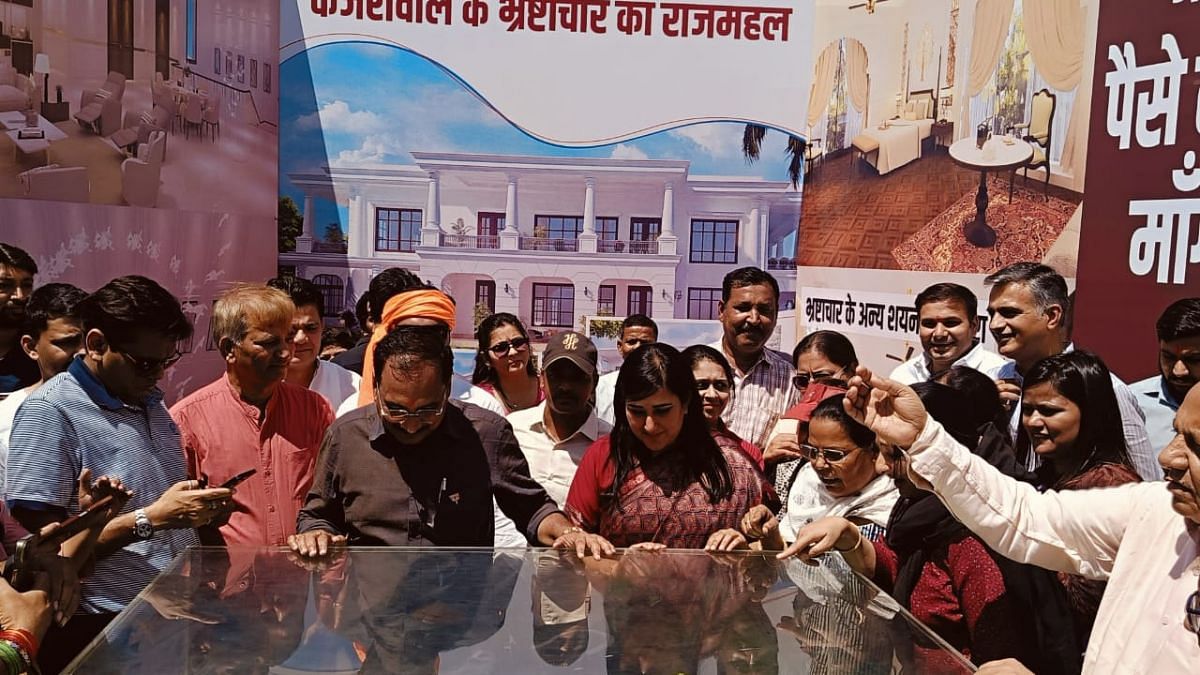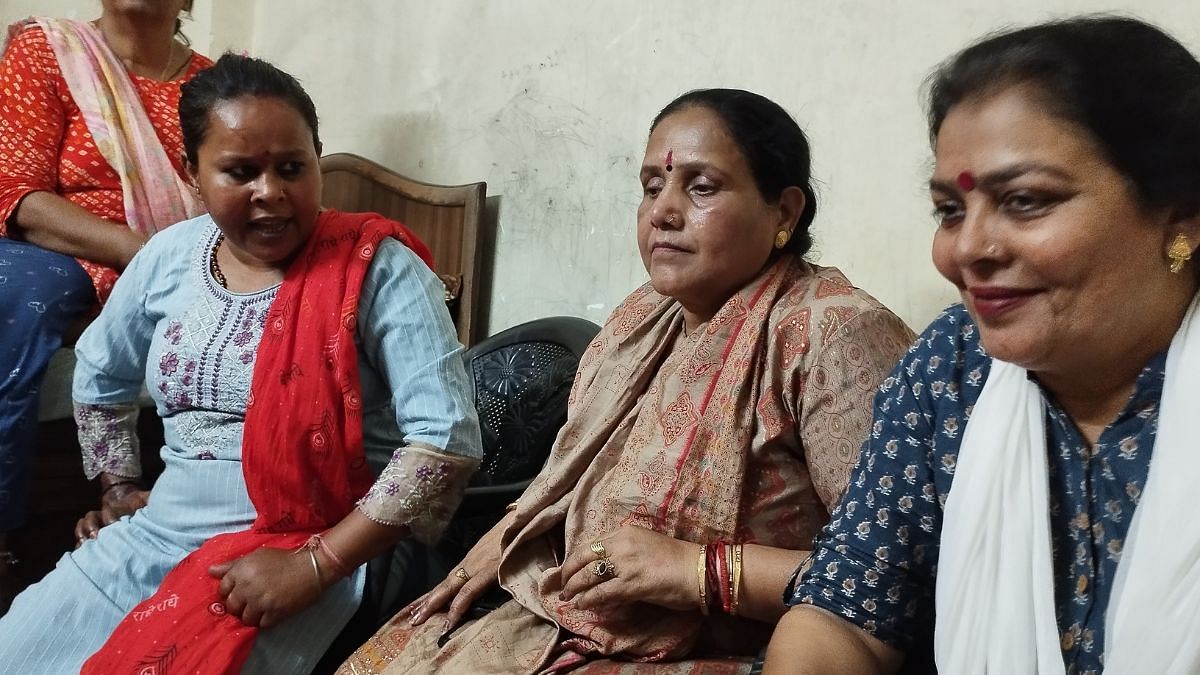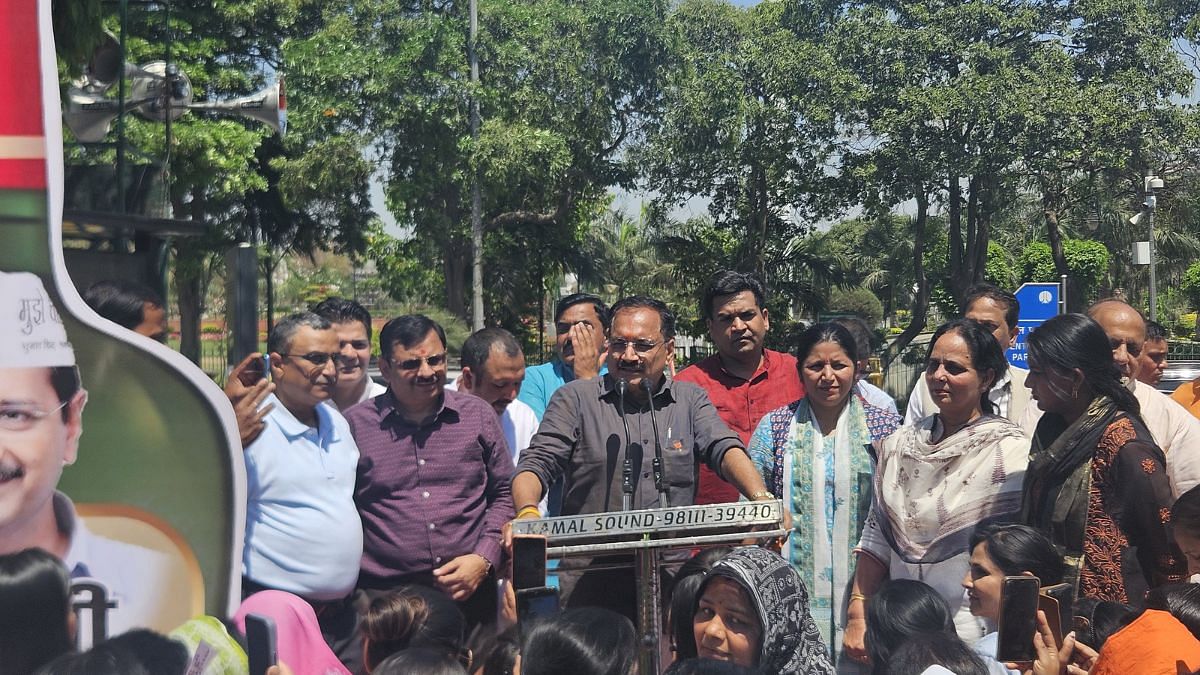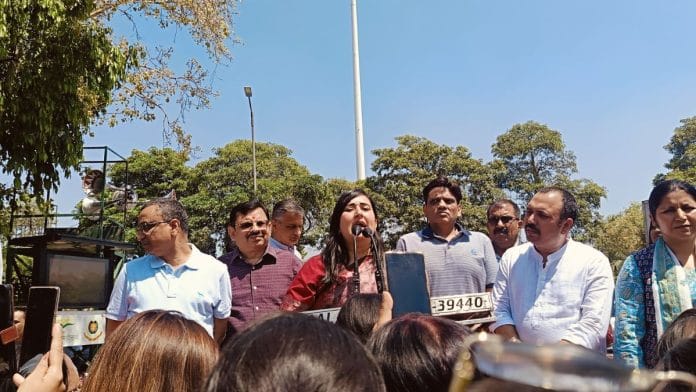New Delhi: BJP’s campaign against Delhi Chief Minister Arvind Kejriwal and the alleged liquor scam has a new target: women voters. The spinmeisters have turned the corruption case into a problem of domestic abuse.
It’s a straight line for BJP. More liquor thekas in Delhi means more battering husbands.
About 15 women are packed into a tiny room on the ground floor of a five-storey residential building near the Durga temple in South Delhi’s Sangam Vihar. Their voices blend into a cacophony of complaints, with a single concern: the impact of the Aam Aadmi Party’s (AAP) liquor policy on their lives.
“When Prime Minister Narendra Modi comes to power this time, he will shut down these liquor shops,” says South Delhi BJP mandal president Samkesh Sidhu.
The women complain that because of the spike in alcohol sales under the excise policy introduced by the Delhi government in 2021, they have become victims of domestic violence.
“There was anger among the women already, and we have gained the benefit of it,” says Delhi BJP’s media department head, Praveen Shanker Kapoor.
The alleged scam provides an opportunity for the BJP to strengthen its stronghold among women. Additionally, the party is trying to project the AAP as ‘corrupt’.
The BJP’s campaign includes door-to-door outreach, office meetings, conversations with people in parks, protests, exhibition of models of Kejriwal’s bungalow with flashy lights, large posters with the message “Invested Rs 52 crore in the palace of corruption”, and rallies in crowded areas such as the Janpath market. These strategies aim to encourage Delhi’s residents to ask questions of the government and challenge its policies.
Apart from memes, posters, and banners, the most striking elements of the campaign are effigies of Kejriwal with liquor bottles.
In 2022, the BJP shared a meme on its social media platform, drawing inspiration from the iconic Hollywood film, The Godfather (1972). The meme portrays Kejriwal, clad in a sleek black suit reminiscent of the film’s protagonist, with the caption “The Fraudfather.” Accompanying this picture is an adapted dialogue, “I made an offer to the Sharab mafia that they couldn’t refuse! #sharabghotala.”
The Fraud father of Sharab Ghotala continues to defend Sharab Mafia despite several arrests in Liquor Scam
BJP aspires for Har Ghar Nal se Jal
AAP aspired for Har Mohalla Theka pic.twitter.com/gWzzJB7xS9
— BJP Delhi (@BJP4Delhi) December 1, 2022
These elements “simplify the scam” for the public to understand without getting into the weeds of policy change, licences, Enforcement Directorate raids, and court proceedings.
On the other hand, the AAP is accusing the BJP of embezzlement. The party has alleged that the BJP took a bribe of Rs 55 crore from liquor dealers.

Also read: Muslims say law and order has improved in western UP. ‘But voting for BJP against our imaan’
Ladies special
“Here, water may not be available in every household, but alcohol will surely be found,” says Priyanka Sharma.
The bare details are all there in the public domain. In July 2022, Delhi’s Chief Secretary Naresh Kumar accused Deputy Chief Minister Manish Sisodia of taking commissions and bribes for granting liquor licences. Kumar claimed that irregularities in the new excise policy led to financial losses of around Rs 586 crore to the exchequer. The money received from commissions and bribes was allegedly used by the AAP in the assembly elections in Goa and Punjab. In August 2022, the CBI filed cases against 15 people, including Sisodia.
However, for Delhi’s women, it’s more than just corruption. They are not only concerned about the increase in substance intoxication among children, but also blame the policy for increasing crime in their localities. The excise policy allowing private players to open “pink thekas”—alcohol shops dedicated exclusively to women—also raised many eyebrows. The BJP opposed this, saying it would encourage public drinking among women.
A Delhi government official had clarified that under the new policy, the retail liquor sector is entirely operated by private players, and there are no designated “pink thekas”. Instead, shop owners have the option to create special counters for women.
Sitting in a corner wearing a light pink suit with a dupatta, Priyanka Sharma finds herself embroiled in trouble due to the 15 liquor shops in her locality. She is quite vocal against it. Attending the BJP mahila mandal meeting for the first time, she wants to join forces with other women. Just a few days ago, BJP Mahila Morcha member Seema Soni knocked on her door and informed her about the issues related to her area. Broken roads, acute water shortage, hassle in getting ration cards, and alcohol were the important points that encouraged Sharma to attend the meeting.

Sharma says that she has been living on rent in Sangam Vihar for decades. Her husband has a habit of drinking alcohol and he often initiates fights and physically abuses her. And AAP’s liquor policy has exacerbated the situation.
“Here, water may not be available in every household, but alcohol will surely be found,” she adds while addressing the meeting.
Sharma mentions that she has to support her family of three by doing domestic work in a bungalow in her locality. Her husband spends her earnings on alcohol, often leaving her unable to pay the rent.
She alleges that since the AAP came to power, there has been an increase in the number of liquor shops in her area—as well as in cases of crime. She has filed a complaint at Sangam Vihar Police Station against her husband, but no action has been taken.
“I have filed a written complaint last month, but nothing has been done yet,” she claims. The stories of all the women in the meetings and protests are similar.
On 10 April, near the AAP office in ITO, Pushpa Pant, 48, from Chhatarpur joined the BJP’s protest against the liquor policy. The day before, she had received a message in a WhatsApp group named “BJP Mahila Morcha” that all sisters must gather at ITO.
“Kejriwal made alcohol free but why didn’t he make milk packets free?” she shouted. Some women at the protest also raised their voices against the “pink thekas”.
“How can women drink alcohol? It’s against our Indian culture,” said a protester.
At the meeting in Sangam Vihar, Kapoor says that by making a special provision for women, the Kejriwal government has achieved something unlike anybody—making alcohol accessible to everyone.
AAP councillor in Chittaranjan Park, Aashu Thakur denied the allegations of corruption. She claims that no charges against Kejriwal have been proven. Thakur adds how AAP leader Sanjay Singh has been released from jail after no evidence was found against him.
Thakur says that her party works to ensure the safety and well-being of women and dismissed the allegations of increasing domestic violence.
“Women are not accusing us in this matter. BJP members are making it an issue. They are afraid of AAP,” she says.

Also read: Election fever & extreme heat alert—state govts yet to learn from Kharghar deaths
Anti-woman policy
According to him, in the last two years, his party has conducted nearly 35 or more protest rallies against the liquor policy, spending several lakhs of rupees. BJP workers are putting all their efforts into this campaign.
The Delhi BJP members are proudly proclaiming that Kejriwal and others are behind bars because of their campaign. Sidhu tells the women that Kejriwal is deceiving them just like he betrayed Anna Hazare.
“The public needed basic facilities here, but he opened liquor shops. There was no need for this,” Sidhu says.
Kapoor says that the party is gearing up to amplify the campaign in the upcoming days. They are also planning to talk about other cases associated with the AAP such as the Delhi Jal Board case, School of Excellence, and fake medicine among others. And the BJP will continue with its campaign until the 2025 assembly election. The excise policy is the most crucial issue for the party.
According to Kapoor, it was affecting many people. The availability of cheap liquor was beyond anyone’s imagination. The scheme offering one free bottle with every purchase made it even more popular.
“Kejriwal’s liquor policy has affected women the most. The scheme of one bottle free on another bottle used to tease women,” Kapoor says while sipping cold coffee at the BJP office canteen in Delhi.
According to him, in the last two years, his party has conducted nearly 35 or more protest rallies against the liquor policy, spending several lakhs of rupees. BJP workers are putting all their efforts into this campaign.
At 7 pm, Sidhu concludes the meeting and picks up her diary and a bunch of posters with Modi’s photograph prominent in them. She ties her pink sports shoes and heads out with a group of women to campaign in the neighbourhood.
“Batao kya ab auratein sharab khareedne ke liye thekon par jaayengi?” one woman says to another. (Will women go to liquor shops to buy alcohol now?) According to Sidhu, this was done to ruin the atmosphere of the city.
“Kejriwal did this to spoil women. This completely ruins women and children,” she says, addressing the women.
(Edited by Ratan Priya)






